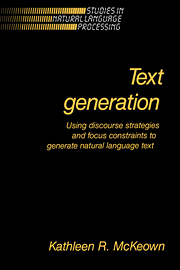Book contents
- Frontmatter
- Contents
- Preface
- 1 Introduction
- 2 Discourse Structure
- 3 Focusing in discourse
- 4 TEXT system implementation
- 5 Discourse history
- 6 Related generation research
- 7 Summary and conclusions
- Appendix A Sample output of the TEXT system
- Appendix B Introduction to Working
- Appendix C Resources used
- Appendix D Predicate Semantics
- Bibliography
- Index
5 - Discourse history
Published online by Cambridge University Press: 23 December 2009
- Frontmatter
- Contents
- Preface
- 1 Introduction
- 2 Discourse Structure
- 3 Focusing in discourse
- 4 TEXT system implementation
- 5 Discourse history
- 6 Related generation research
- 7 Summary and conclusions
- Appendix A Sample output of the TEXT system
- Appendix B Introduction to Working
- Appendix C Resources used
- Appendix D Predicate Semantics
- Bibliography
- Index
Summary
Tracking the discourse history involves remembering what has been said in a single session with a user and using that information when generating additional responses. The discourse history can be used to avoid repetition within a single session and, more importantly, to provide responses that contrast with previous answers. Although the maintenance of a discourse history record was not implemented in the TEXT system, an analysis of the effects such a history could have on succeeding questions as well as the information that needs to be recorded in order to achieve those effects was made. In the following sections some examples from each class of questions that the system handles are examined to show how they would be affected by the various kinds of discourse history records that could be maintained.
Possible discourse history records
Several different discourse history types, each containing a different amount of information, are possible. One history type could simply note that a particular question was asked and an answer provided by maintaining a list of questions On the other hand, the system could record both the question asked and the actual answer provided in its history. The answer itself could be maintained in any of a number of ways. The history could record the structure and information content of the answer (for TEXT, this would be the instantiated schema). Another possibility would be to record some representation of the surface form of the answer, whether its syntactic structure or the actual text.
- Type
- Chapter
- Information
- Text Generation , pp. 171 - 184Publisher: Cambridge University PressPrint publication year: 1985



